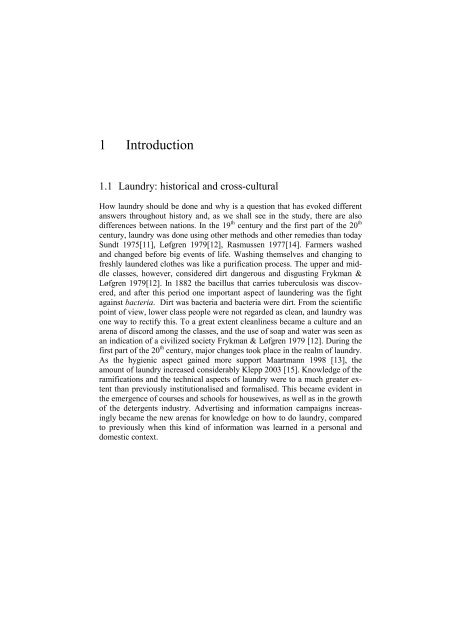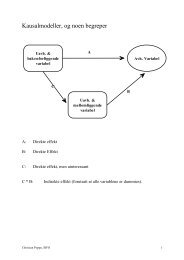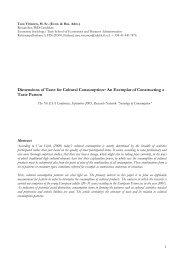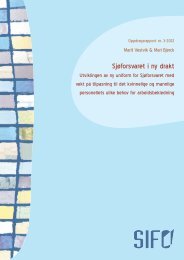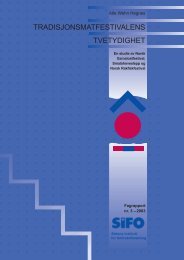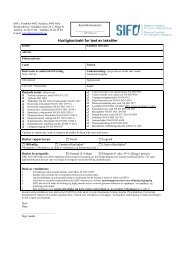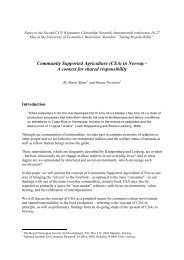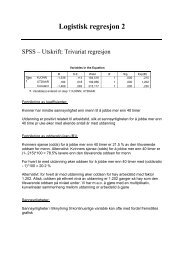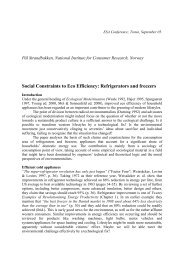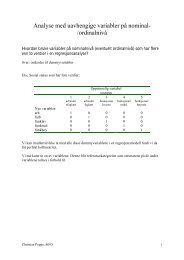an investigation of domestic laundry in europe - habits ... - SIFO
an investigation of domestic laundry in europe - habits ... - SIFO
an investigation of domestic laundry in europe - habits ... - SIFO
You also want an ePaper? Increase the reach of your titles
YUMPU automatically turns print PDFs into web optimized ePapers that Google loves.
1 Introduction1.1 Laundry: historical <strong>an</strong>d cross-culturalHow <strong>laundry</strong> should be done <strong>an</strong>d why is a question that has evoked different<strong>an</strong>swers throughout history <strong>an</strong>d, as we shall see <strong>in</strong> the study, there are alsodifferences between nations. In the 19 th century <strong>an</strong>d the first part <strong>of</strong> the 20 thcentury, <strong>laundry</strong> was done us<strong>in</strong>g other methods <strong>an</strong>d other remedies th<strong>an</strong> todaySundt 1975[11], Løfgren 1979[12], Rasmussen 1977[14]. Farmers washed<strong>an</strong>d ch<strong>an</strong>ged before big events <strong>of</strong> life. Wash<strong>in</strong>g themselves <strong>an</strong>d ch<strong>an</strong>g<strong>in</strong>g t<strong>of</strong>reshly laundered clothes was like a purification process. The upper <strong>an</strong>d middleclasses, however, considered dirt d<strong>an</strong>gerous <strong>an</strong>d disgust<strong>in</strong>g Frykm<strong>an</strong> &Løfgren 1979[12]. In 1882 the bacillus that carries tuberculosis was discovered,<strong>an</strong>d after this period one import<strong>an</strong>t aspect <strong>of</strong> launder<strong>in</strong>g was the fightaga<strong>in</strong>st bacteria. Dirt was bacteria <strong>an</strong>d bacteria were dirt. From the scientificpo<strong>in</strong>t <strong>of</strong> view, lower class people were not regarded as cle<strong>an</strong>, <strong>an</strong>d <strong>laundry</strong> wasone way to rectify this. To a great extent cle<strong>an</strong>l<strong>in</strong>ess became a culture <strong>an</strong>d <strong>an</strong>arena <strong>of</strong> discord among the classes, <strong>an</strong>d the use <strong>of</strong> soap <strong>an</strong>d water was seen as<strong>an</strong> <strong>in</strong>dication <strong>of</strong> a civilized society Frykm<strong>an</strong> & Løfgren 1979 [12]. Dur<strong>in</strong>g thefirst part <strong>of</strong> the 20 th century, major ch<strong>an</strong>ges took place <strong>in</strong> the realm <strong>of</strong> <strong>laundry</strong>.As the hygienic aspect ga<strong>in</strong>ed more support Maartm<strong>an</strong>n 1998 [13], theamount <strong>of</strong> <strong>laundry</strong> <strong>in</strong>creased considerably Klepp 2003 [15]. Knowledge <strong>of</strong> theramifications <strong>an</strong>d the technical aspects <strong>of</strong> <strong>laundry</strong> were to a much greater extentth<strong>an</strong> previously <strong>in</strong>stitutionalised <strong>an</strong>d formalised. This became evident <strong>in</strong>the emergence <strong>of</strong> courses <strong>an</strong>d schools for housewives, as well as <strong>in</strong> the growth<strong>of</strong> the detergents <strong>in</strong>dustry. Advertis<strong>in</strong>g <strong>an</strong>d <strong>in</strong>formation campaigns <strong>in</strong>creas<strong>in</strong>glybecame the new arenas for knowledge on how to do <strong>laundry</strong>, comparedto previously when this k<strong>in</strong>d <strong>of</strong> <strong>in</strong>formation was learned <strong>in</strong> a personal <strong>an</strong>d<strong>domestic</strong> context.


